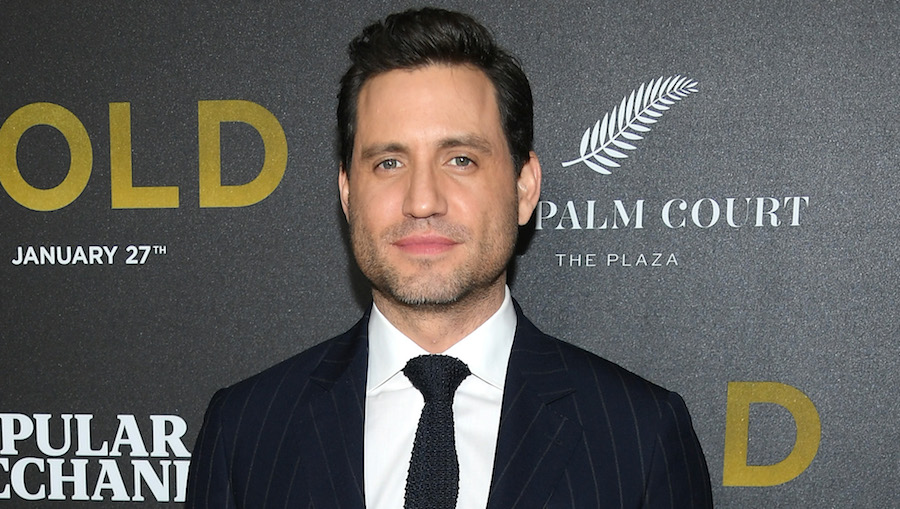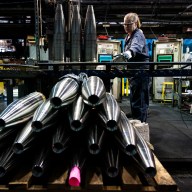The last time we spoke to Edgar Ramirez, the world was a cheerier place — relatively speaking, of course. It was back in September, before the release of “The Girl on the Train.” Specifically, it was the day of the first presidential debate. Some of us were nervous yet cautiously optimistic, hoping Hillary Clinton would sway Trump voters to her side. Ramirez wasn’t feeling it. When we speak again, this time for his new movie “Gold,” he stops short of saying “I told you so.” “I come from Venezuela; for us it was easier to see it coming,” the actor (“Carlos,” “Joy”) tells us. He’s not even surprised that America’s new president has not backed down on his volcanic, unpredictable rhetoric, or that he looks like he’ll fulfill some of his scarier campaign promises. “I think those guys always try to do what they said they were going to do.” On paper, “Gold” doesn’t sound like a distraction from our problems. It tells the story of Kenny Wells (Matthew McConaughey), a floundering businessman who strikes big on Wall Street when he claims to have found gold buried deep in the Indonesian jungle. Ramirez plays Michael Acosta, the geologist tasked with helping him locate and mine it. Things don’t go according to plan. And yet Ramirez argues that the film — semi-loosely based on the 1993 Bre-X mining scandal — offers hope, on top of a stark look at greed. RELATED: Interview: John Carroll Lynch on what “The Founder” has to say about Trump On top of being an actor, you’re also a journalist. This is a scary time for reporters, because we’re dealing with an unhinged, possible kleptocrat who has trained his followers to distrust the media. It’s easy to watch this film and feel like it’s another grim reminder of what’s going on in the world today, when greed is being encouraged, when our president may only be out for himself. But the relationship between Kenny and Mike winds up being one of true friendship. They’re not always doing the right thing, though, which makes them more interesting. It’s also a fascinating story, because it shows a real-life case where a lot of people rushed into what sounded like a great idea without looking at the details or thinking rationally. That explains how certain opportunists operate. They love the thrill of the deal. They don’t always think about the art of it. We’ve been trained to believe unimaginable wealth will make us happy. I don’t think I’d ever want too much money. As someone who reviews films on top of doing interviews, I have to say that I think there shouldn’t be a wall between filmmakers/actors and critics. There should be more of a dialogue. Both sides have a lot to get out of speaking with each other. Instead we tend to live in our own bubbles.
You’ve got to be very careful not to buy into the craziness. Because it’s contagious. We’re human beings in the end; we’re permeable. You’ve got to be very careful not to respond in the same manner. It’s very important to stay grounded. Because it’s very easy to buy into the chaos. You get tired of listening to the things that aren’t right, that are contradictory. You feel you’re being lied to your face, that your reason is being challenged in a very cheap way. However, it’s important not to buy into the brutality of it all.
What I find so interesting and moving and beautiful is that, yes, the story exists in a world driven by greed, yet you have these two characters who are not in it for the money and the wealth and the power. They’re in it for the gold. The gold, for them, means self-respect and self-worth. It’s a world where everybody is trying to take everybody else down, yet you have two characters who manage to be loyal to each other and keep their word. In a time when words mean nothing, or some people are trying to devaluate the worth of words, these guys keep their word.
They’re not perfect; they’re flawed. They’re not indifferent or exempt from the anti-values of the world they live in. But they’re loyal. Their agreement is based on a handshake. That’s beautiful. That’s very refreshing. That gives me hope.
Does it ring a bell? [Chuckles] When it’s so good, you ignore the red flags. It’s like when you fall in love: You rationalize away all the red flags, because you’re in the chemical haze of falling in love. It’s electrifying.
A friend recently published a book [Jonathan Jakubowicz’s “The Adventure of Juan Planchard”], and there’s a line there that is great. He says “Having money and happiness feel very close, but it requires maturity and intelligence to tell the difference.” Being rich and happy are very close, but they require a very high IQ and a lot of maturity to tell the difference.
Having a lot of money is a lot of work. I agree with you, I just want to be comfortable. I don’t want money to be an issue.
We do the movies and you give your opinions, but there’s never a conversation, to see if we agree or disagree. We’re interconnected yet so isolated. And every response each side gives almost feels defensive. It isn’t, really. That’s why I like publications like Cahiers du Cinema in France, which is a critics’ magazine that talks to director and actors. It would be great to see something like that [in America]. You discuss cinema from the point of view of the trained eye, and then from the ones who are making the movies.
Edgar Ramirez: Journalists must stay grounded in the age of Trump

Getty Images
Follow Matt Prigge on Twitter @mattprigge


















